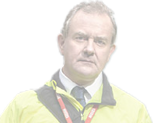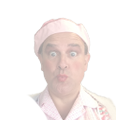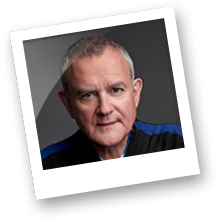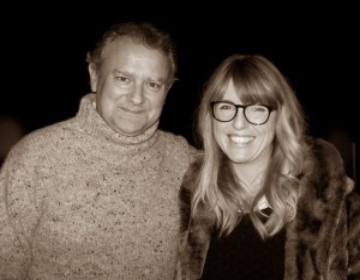Write-up by Keepsake Magazine
As part of the TV Series Festival at the Ciné Lumière (within London’s Institute Français), actor Hugh Bonneville answered questions put to him by television reviewer Boyd Hilton – and members of the audience – about his biggest roles. He shared insight into the bonkers world of acting, plus what it’s like playing Ian Fletcher in Twenty Twelve, and Lord Grantham in Downton Abbey.
Venturing out in heavy snow on a Sunday night to join the small audience in South Kensington, I found myself utterly engrossed in the tales of Mr B. Charming, funny – and a master of British self-depreciation – he was open and honest to questions, and afterwards allowed himself to be mobbed for photos by everyone who came along. I was delighted to shake his hand, express my love of Downton, and even chat about my mother in New Zealand (also a fan) without any sense that he was merely feigning interest. (Clearly a testament to either his character or his acting skills.)
Frankly, one wouldn’t expect such patience, warmth and approachability from someone with Bonneville’s global popularity (a local charity auction to have lunch with Bonneville when he was in New Zealand went for nearly $3,000 – that’s quite a lunch). Yet he didn’t sod off home to escape the snow and put his feet up – he made time for people. Actively chatty on Twitter, and so down to earth in person you just want to sling your arm ‘round him and buy him a beer, Hugh Bonneville genuinely comes across as a jolly good fellow.
From anachronisms and improve in Downton Abbey – and insight into some eyebrow-raising plot twists – to the reality of auditions, here are some highlights of Q&A with Hugh:
[NOTE: DOWNTON SPOILERS AHEAD IF STILL IN SERIES 3!]
On why Downton Abbey became such a huge success:
“It’s the million dollar question. These things go in waves. I think Downton came along at a time when there was a resistance to such things. I know Gareth [Neame] didn’t even take it to the BBC. As brilliant as the BBC costume dramas are, he thought there was a certain way it would be made – where as he instinctively felt there was something slightly different about this script. I think it always comes down to script, characters, the setting, the sense of the serial. You don’t know what’s happening. And I think on the whole – bar one obvious exception – very good acting [laughs]. There’s an appetite for period stuff, there always has been and always will be. I think it’s that page turning sense. Those of you who follow the show want to know what happens next. It’s like a Jane Austen adaptation or whatever, but of course none of us, apart from one man, know the ending. And that’s why we’re hooked, and why we want to keep coming back for more.”
On [Downton creator] Julian Fellowes’ character and plot twists:
“The scripts arrive and I describe it as opening a Christmas present each time because you don’t really know what’s going to happen next. I think once or twice on reading a script I’ve called him to say ‘I don’t really understand this’… you know, the whole concept of this entail was quite a dense one to get your head around and I had to talk to him about that. We’re all flawed human beings – I mean, even the nastiest axe murderer’s probably nice to his mum. So these constant surprises, as long as they’re not utterly ridiculous, so long as there is a degree of humanity behind them and the actor can get his head around it, then I love the twists and turns he’s thrown to us. So far I trust him, until he completely loses his marbles [laughs].”
On his character Lord Grantham:
“No system can work if you are rotten to all your staff all the time. You depend on them, the cogs of that machine have to work. And so even though [Robert] comes from a very conservative background – especially with a mother like that, who he probably rarely saw apart from once a day, via a nanny – I liked his liberal instincts, and sense of compassion. And of course what I also love about Julian’s writing is that as soon as you get to know a character he starts pulling the rug out a bit and changing your perception. Be it, Robert falling apart a bit in series two, or Thomas Barrow the evil footman who actually, I believe be the end of series three you have a great deal of compassion for. I think just the fact that all these characters seem to be three-dimensional in the way they are created. They’re not just off-the-peg. [Robert’s] not the brightest of sparks I would say, he’s rotten with investments… never trust him for your investment portfolio! In the same way you shouldn’t trust Dr Clarkson. We all call him Dr Death on set; you know when Dr Clarkson’s around something’s going to go wrong!”
On the major deaths in series 3:
“We had to keep very quiet about both losses. We’d known for a year, and it was quite weird seeing all this speculation in the press about what was happening. And it was really sad because we are a close family on this set. Both actors were wanting to leave for their own reasons – which is completely understandable, they’re not contracted to stay [but] I think as Julian said, the problem was that they were both upstairs characters. It was hard to send them off somewhere easily. If they’d been downstairs characters they could have got a job in another house, but when you’ve got central characters like these two, I’m afraid it was the death knell.”
On TV spoilers:
“Spoilers really disappoint everyone. I think the time is coming – it has to come – where we have same-day transmission. One completely understands that all around the world each country has different schedules, and literally, different seasons. So every region has their reasons for scheduling, and time lengths of slots and that sort of thing. But I think the time is coming. The fact that we are a linked globe now, and in terms of dramas holding the excitement back, it’s very hard. I think audiences will tolerate a window of up to a month of delay [but] New Zealand started showing 3 weeks after the UK, Australia isn’t showing series 3 until next month, America is part way through. Even if you don’t look at the internet, [spoilers] leak into the paper, they leak into the market. I suppose some people will say, look at the Olympics: NBC were showing the Olympics after everyone knew Usain Bolt had won, but everyone still tuned in to watch it. But I think there’s a degree of enjoyment missed because of the excitement and anticipation.”
On Julian Fellowes’ involvement in the filming:
“He doesn’t tend to sit back, he tends to rush back and get on with the next episode. Having said that he’s very, very hands on in the pre-production stage. I can’t stress it enough, this is his baby, and his hands are all over it, to the extent that at the beginning of series two I remember having endless costume fittings over a waistcoat colour. He thought it should be, I don’t know, white, and [costume designer] Susannah Buxton thought it should be cream. There were endless discussions about the type of cream and the type of white and I can’t remember who won in the end. We film in blocks of two episodes so we film episode one and two – we’ll do a patch at Highclere [Castle] then we’ll do a patch at Ealing studios, back to Highclere, and we’ll repeat the process for the next two, and the next two, and then we’ll do the Christmas special on its own. And [Julian’s] busy writing his way all the way through that. But we do have Gareth, our main executive – who really created the show with Julian – overseeing it, and we have one or two producers on the set, who are there to help each director who comes in to create a sense of continuity.
On his creative input:
“[Julian’s] got a very particular rhythm, as does John Morton in Twenty Twelve. It’s very particular and you mess with it at your peril. The only line I can remember changing was in this last series when Branson’s brother comes along and starts getting tiddly in the drawing room, and I say something like “we’ll end up singing Molly Malone by the end of the evening”. And in the original script it was “we’ll end up singing…” well, not my old man’s a dustman, but some equivalent music hall song. Luckily Allen Leech, Tom Branson, was there, and I said, ‘wouldn’t it be more appropriate if I referred to an Irish song? Give me an Irish song…’ and he said Molly Malone. So we shot it both ways, and Molly Malone stuck in. In terms of story lines, sometimes you raise an eyebrow, like Matthew leaping out of his wheelchair… [laughs] But nooo, Julian said ‘there’s this story’… and he quoted chapter and verse on this case study… so it does happen! It was quite a big leap, let’s say. But we coped with it.”
On TV show piracy:
“It’s a huge discussion on the nature of download piracy. I would say we work our arses off at Downton Abbey for six months of the year to make the show as good as we possibly can. I was talking to the director of photography Nigel Willoughby about it, and he said it aggrieves him when he reads about how much piracy there is. When people are watching on a stuttering download on their laptop – I know there are some very good streaming systems these days – but on the whole, you’re watching it not in the best quality, with a sound that isn’t as rich and full, and colours that aren’t as rich and full as we made it for. We made it to the very highest spec, and you’re cheating yourself, really, of a wonderful TV experience.”
On watching Downton Abbey:
“I tend to watch it at home, with my missus, and I tend to watch it twice – I spend the first wondering ‘why have they cut that scene, and why have they put that scene here, and oh I see, they’ve used that angle, that’s interesting’, or ‘that was the day I had toothache’, or that sort of thing. And then the second time I can watch it through and realise I am Brad Pitt, basically [laughs].
On working with Shirley MacLaine:
“Shirley is a legend; I mean I’ve always been in awe of her. As soon as I heard she was cast I thought a) this is brilliant, and b) oh my god, I’m going to meet the woman who was in The Apartment, which is a movie I’m extremely fond of. She’s really into reincarnation and she absolutely knew about the ghosts in Highclere Castle; she could feel them around as if they were friends. She was a hoot. We got her to sing and hoof a bit which she can still do, bless her, aged 78. And she and Maggie… got on like a house on fire. It could’ve gone either way, you know: two great icons upstaging each other! But no. And there was some improvising in one particular scene, where Maggie’s having a doze in a chair, and Shirley is singing at the piano, which was written in. Shirley had said to Julian, [puts on an American drawl] ‘Why not give me a song?’ She did some wonderful improvising, drifting over to talk to Maggie – she ended up sitting on Maggie at one point. And she said to the director, ‘Do you think it’s too much?’ and he said, ‘Er, tone it down a bit’. It was a real breath of fresh air to have Hollywood glamour with is for a few weeks. And who knows? She might be back.”
On those tricky-to-film dinner scenes:
“I think one of them took two and a half days. Of course, on screen it takes about you know, two minutes, but whenever we see [on the script] “interior dining room” we think ‘oh god’. [laughs] It’s a technical thing, because of eye lines – it’s called crossing the line, which I still find really complicated, but it’s to do with where your eyes are looking, left or right, and so you have to shoot over this shoulder, and that shoulder, and basically go around the table.”
On the Downton food:
“We have our ordinary catering team to feed the troops, but also an onset caterer who does, if you will, the period food. The detail is amazing… even the little menu cards, which you, the audience, can’t read, are absolutely the menu that we’re eating that day. I bang on about the detail of the art department and each department – they really work to the best of their game. In the first series there was some fish, which of course at 8am – in the first series we didn’t have electricity in the house so everything’s candles, and you’re doing a dining room scene in high summer, but with blackouts, and lights, and the candles… and by 11am those fish are pretty honky! And then there was “Asparagus-gate”, when we all got a bit nervous about how to eat asparagus in 1915 – would it be with a knife and fork, or would it be dipped? And unfortunately our historical advisor wasn’t available that day. So we chopped them up and pretended they were beans.”
On eagle-eyed anachronism spotters:
“I’ve told this story before but it’s my favourite. In series 1, when Cora had the miscarriage, and Thomas the footman says, ‘I don’t know what everyone’s making such a fuss about. At this stage in the pregnancy it’ll only be the size of a hamster’. Someone actually wrote in and said ‘The Syrian hamster was not introduced to northern Europe until 1924. The actor should have said small rabbit’ [laughs]. And we did have a TV aerial in series one – but these things happen.”
On the future of Downton Abbey:
“We’re doing four. Whether there’s a fifth series…? I’m sure the money men would love it to go on forever and ever – because it does sell extremely well around the world, but I think unless we all start doing wobbly-stick acting… some of us are doing it already… The next series is nudging forward, about 6 months, and I think we’ll start bumping into other period dramas time-wise soon if we’re not careful. I just hope Julian quits while he’s ahead. He’s a wise soul, he’ll know when he’s ready.”
On the difference between Lord Grantham, and Ian Fletcher, his character in Twenty Twelve:
“I suppose both characters are men who are both notionally in charge of a ship that could go out of control at any moment. But the writing is so entirely different, the way it’s made is so entirely. For those who don’t know the show, it was an imaginary team working below Sebastian Coe trying to organise the Olympics, and the sorts of things that could go wrong – some of which actually did go wrong in real life. But more to the point it was about management speak and committees and the way in which we, particularly as Brits, are brilliant at talking a load of hot air and not really getting on with things. Last year in the build up to the Olympics I was literally filming 7 days a week: when I wasn’t doing Downton I was filming Twenty Twelve, and we’d seen this problem coming over the horizon, that there was going to be a huge clash. And so [writer/director] John Morton cleverly came up with the idea that I should be in hospital for an entire episode so they could shoot all my stuff in one place in two days. But even though it appears to be very ramshackle, and loose, and free, and overlapping dialogue and all that, every single ‘um’ and ‘er’ is scripted. It’s like a really clever piece of orchestration and it was incredibly hard to learn. I had a couple of cue lines around the set because I couldn’t remember the next line, because they’re so bonkers what they come up with.
On filming Mr Stink:
“David Walliams [has] written this series of wonderful books, one of which is about a tramp called Mr Stink, whose aroma really does affect everyone around him. But there’s this lovely girl who’s a bit of a loner who takes him in around Christmas to live in her shed in the bottom of the garden. She’s got a very ambitious mother who wants to be a politician, a rather sweet and haphazard father who’s just lost his job but can’t admit it, and so he hides in the cupboard under the stairs every day. Anyway, by a force of circumstance they both change each other’s lives. I’d just finished Twenty Twelve and Downton, and was on holiday actually, and for the last couple of years, every time I stop filming I stop shaving. So I started growing this beard. And the BBC rang and said, ‘Don’t shave your beard off, we’ve got this idea’ and it was Mr Stink. What’s brilliant about it is that it does make an overtly political point about homelessness bit is full of poo and fart jokes and is very funny, and very charming.”
On working with Pudsey the dog in Mr Stink, as opposed to Downton’s dog, Isis:
“Well, Isis… I mean I have to be fair about my leading bitches. There’s room for two bitches in my life [laughs].”
On auditioning for roles:
“I do go to auditions. Things changed after Notting Hill. And I was… not angry, but I was awoken to certain truths about the industry, particularly the film industry. I spent the first ten, twelve years of my career just doing theatre, I never ever thought I’d do TV and film. My raison d’etre, if you will, was theatre… Then I got cast in Notting Hill and suddenly I was able to audition for things I wasn’t allowed to audition for before. And it made me realise that ultimately, you’re a commodity. There was a film I did where I read the script and there was a lovely part, a supporting part, and I rang a great friend of mine and said you must audition for this because you’d be great in it. He rang back half an hour later and said ‘my agent said I can’t audition because the film producers say that my films don’t gross enough’. The number-crunchers at these various film companies, this is the way they do it – I’m learning it more and more. That was a real eye-opener. And it was simply because I had been in something that was “hot”. I spent a lot of my early telly career, nearly 20 years ago now, being mystified by it all. You have to treat every audition as if you’re the only person in the world to play that part, walk out of the room and pretend it never happened. Because 9 times out of 10 you won’t get the part. And it’s just one of those things.
On his career success since Downton:
“Without in any way wishing to sound churlish, it’s just another job, actually. I love it to bits, as I hope you appreciate, and I’m enormously proud of it, and the fact that it is so loved around the world. But it’s a merry-go-round that will stop at some point and we’ll all get off and we’ll go in different directions. I think any actor who says ‘oh I’ve got it all sorted now’ is a big fat fibber. We’re all freelancers, we’ve all got our thumb out for the next ride, the next job. I am truly blessed to do something I love, and I’ve been very lucky to do it for 25 years without someone tapping me on the shoulder and saying, ‘go and get a proper job!’. So long may that continue. I’m not taking anything for granted.
On what happens in Downton Abbey series 4:
“We were just on a publicity tour in America end of last year, and my son was on a plane sitting next to [executive producer] Gareth Neame, and he was desperately trying to lean over his shoulder as he was reading the draft of episode one. All he saw was that Carson says the word “what?” at some point [laughs. So I genuinely don’t know. That is part of, again, my naivety and all of the thrill, and I can’t wait to see what happens next.”
Thanks to Hugh Bonneville, Boyd Hilton, and the French Institute.









